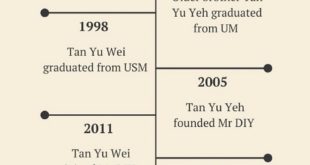Every crisis is an opportunity for disruption.
Singapore’s job market might not be at its peak right now, but it’s the perfect time to launch a startup. Moreover, businesses ideas that survive crises tend to be more resilient.
First-time Singaporean entrepreneurs now have access to a grant of S$ 50,000 to help them kickstart their business. A three-month venture-building program will also be launched to help get your ideas off the ground.
If the only thing standing in your way is the lack of a great idea to capitalise upon, we’ve picked out some in-demand business ideas in 2020.
1. E-commerce
Retail is so 2019. With the rise of giants like Shopee, RedMart and Qoo10, e-commerce is booming more than ever in Singapore.
Moreover, COVID-19 has essentially shifted nearly all our services online. In Southeast Asia, online sales soared by 96 per cent for the week ending May 11.
This is why now’s a good time to get in on the e-commerce game as a distributor, be it selling snacks, beauty products or even pet food.

Far from being limited to household essentials, consumers are also spending on items aimed at health and wellness as they adapt to the new normal, like yoga mats and home office furniture.
2. Food Or Grocery Delivery
Singaporeans are willing to pay for convenience, which is why we are seeing an uptick in the demand for delivery services.
With COVID-19, many consumers have also switched to ordering their food or groceries online as opposed to stepping out of their houses.
The food delivery market is booming as consumers increasingly call for takeaway. Singapore’s food delivery revenue is expected to hit US$ 464 million (S$ 647 million) by 2020, according to a Statista report.

In spite of the market hold of the ‘big three’ — GrabFood, Foodpanda and Deliveroo — at least 10 new platforms have leapt on board the food delivery bandwagon.
Recently, ride-hailing app TADA has also joined the scene with the launch of TADA Fresh Market, which delivers groceries from wet markets directly to your doorstep.
3. Sustainability-Focused Services
In spite of a global pandemic, sustainability remains a hot-button topic as consumers are more aware than ever of the ways their new purchasing decisions are impacting the environment.
Discarded masks and food delivery packaging have been showing up on Singapore’s shores, prompting spontaneous beach clean-ups organised by members of the public.

Singaporeans are estimated to have produced an additional 1,334 tonnes of plastic waste during the circuit breaker. It’s no surprise then to see enterprising businesses springing up to encourage sustainable lifestyle habits.
Launched in July amid the circuit breaker, susGain is a Singapore app that rewards its users for every responsible purchase.
4. Food Tech
Yes, F&Bs are struggling but Singapore’s rabid love of all things gastronomical remains constant. That’s why new innovations in the food industry are gaining traction.
Singaporeans have found ways to overcome the high overheads of retail and labour costs, which has led to the rise of cloud kitchens, drone “delivery riders”, or virtual F&B startups built specifically for delivery.
Now’s indeed a good time to venture into the food tech industry. In particular, lab-grown food has seen a massive stimulus in seed funding.

Whether that’s recreating breast milk from stem cells or developing jackfruit-based pulled pork, these F&B innovations could solve problems associated with a pandemic-stricken food supply chain.
5. Digital Marketing
Although circuit breaker has ended in Singapore, Singaporeans are still advised to stay home as much as possible to prevent the risk of COVID-19 infection.
As most of us are bored at home, screens — big or small — have become the key source of entertainment to combat the blues.
Influencers, for one, have been profiting off their virtual presence. Steven Lim, a Singaporean personality who made his debut on Singapore Idol in 2004, earned over S$ 20,000 a month making birthday shoutout videos.

Platforms like Sendjoy and Authentic Celebrity Experiences let celebrities make money off personalised video messages, and apps like Partipost let you earn up to S$ 100 with a simple social media post.
6. Gaming
Singaporeans are reported to have spent more time playing games than any other country in Asia.
Platforms like Twitch and Steam reported a spike in user adoption as gamers moved online to get their fix.
One of Riot Games’ latest releases, Legends of Runeterra, saw close to a 500 per cent increase in the total number of trials in Singapore. Meanwhile, gaming retailer Qisahn saw 40 per cent sales increase during COVID-19.

Singapore gaming chair manufacturer Secretlab also saw a “massive surge in demand” for their chairs during this pandemic period.
Since the circuit breaker period, many Singaporeans have been encouraged to work from home. As rooms turned into offices, many have invested in sprucing up their work-from-home setup.
Featured Image Credit: Eat Roam live / Hive Live / World Best News / CNBC



